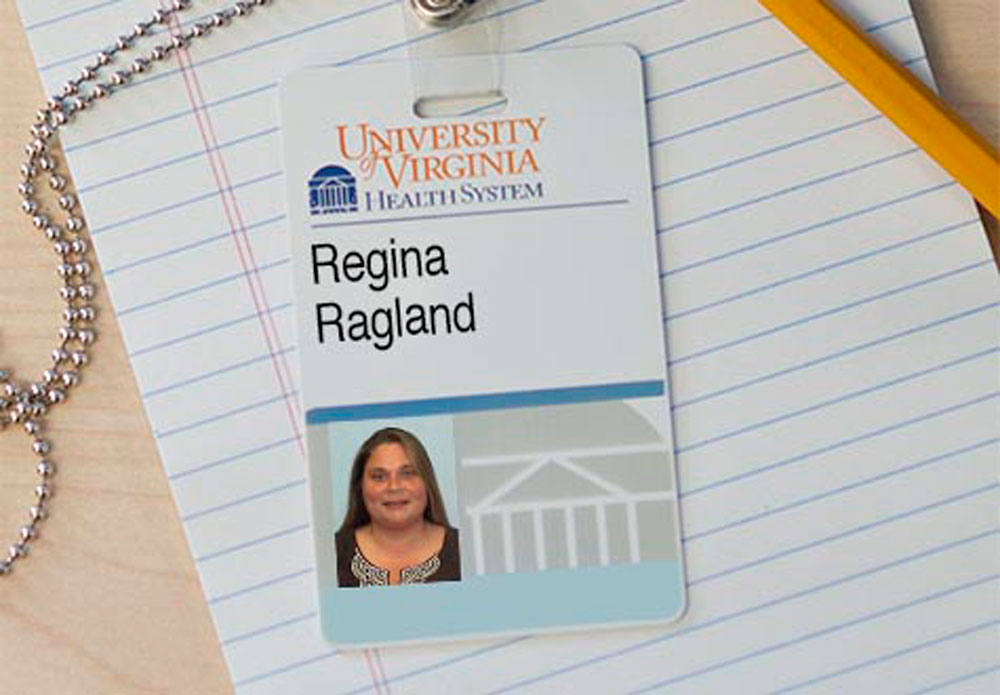Meet RN to BSN student Regina Ragland

It’s 8 a.m. on a Monday, and UVA Medical Center’s thoracic cardiovascular (heart and lung) unit feels quiet, aside from an occasional beep from a series of monitors behind the nurses' station and the usual exchange of pleasantries among employees.
To RN Regina Ragland, however, it’s an “unusual day" on the unit, given the dearth of patients. The 30-bed unit is often full, and constantly hopping.
Although the quiet offers clinicians there a pause, it's another typically busy week for Ragland. Besides her full-time work and studying for a certification exam, she’s also seeking a bachelor’s of science in nursing degree at UVA School of Nursing through its 21-month, part-time RN to BSN program, the culmination of a nearly seven-year journey in education.
That means roughly three hours of class one day a week, and two to four hours of homework each week. Manageable, says Ragland, even with a full-time job.
The Path to Nursing
Ragland hasn’t always been a nurse. She grew up in Nelson County, near Charlottesville and worked for 18 years at a mail order company after high school. Starting in sales, she worked her way up to an office manager position and, ultimately, became the company's treasurer.
But she'd always been interested in nursing and healthcare. She cared for family members when they were sick, and the work came naturally to her.
“I didn’t pursue higher education after high school, because I really wasn’t mature enough to understand the value of education,” Ragland says. “As I got older, I had thought about going back to school, but things always got in the way. I finally decided if I was going to get my nursing degree, I just had to jump in, because no time was ever going to be the ‘right time.’”
Ragland began taking classes at Piedmont Virginia Community College to get an associate’s degree in nursing (becoming an RN doesn’t require a bachelor’s degree). Because she was also still working full-time, the process took 4.5 years.
“Getting my RN to BSN is actually a little easier than that,” she laughs. Her program at UVA will last a little less than two years, including summer classes, and she's on track to earn a BSN in May 2018.
Ragland always planned to get a bachelor’s degree someday. She asked around about RN to BSN programs, and someone recommended the UVA School of Nursing. Before she could even start the program, she needed some pre-requisites, which she mostly took online.
And while Ragland’s busy with work and school, she still finds time for reading, going to the gym and taking care of her three dogs. She enjoys spending time with her colleagues outside of work; about once a month they plan unit outings such as snow tubing.
Why UVA's RN to BSN?
This distinctive program offers licensed nurses who have associate's degrees or nursing diplomas a pathway to earning a BSN degree in less than two years. RN to BSN graduates benefit personally, financially and professionally from the program, and often take on greater responsibility and active leadership roles at work, earning greater professional mobility. Many RN to BSN graduates also move on to graduate study.
At UVA, RN to BSN grads with associate's degrees are guaranteed admission to the School's highly-rated program, which offers enrollees the change to choose their own electives and prospective students the chance to take up to three courses to 'test the waters' (choosing from pathophysiology, statistics, leadership and nursing research or a UVA elective) before even applying to the program.
RN to BSN courses convene weekly, on Grounds, and are taught by full-time UVA Nursing faculty. Class size tends to be small (<30 students per class), and graduates often earn graduate credits toward a master's or higher degree, should they wish to continue their education.
Beyond the personal satisfaction and career advantages, multiple studies show that when hospitals have more nurses with BSN degrees, fewer patient deaths and complications occur, and patients stay in the hospital for a shorter amount of time. A widely-cited 2010 Institute of Medicine report recommended that by 2020, 80 percent of the nursing workforce should have a BSN.
UVA shares the same goal for its nursing workforce. As a result:
- All registered nurses who are hired after January 1, 2013 are required to get their BSN within five years of their hire date
- Once they get the BSN, they’re eligible to receive a 3.5 percent pay increase
- RNs — and all UVA Medical Center employees — receive up to $5,250 per year toward tuition
And even though the requirements don’t apply to Ragland, given her pre-2013 start-date, she's forged ahead nevertheless. When she earns her BSN, she’ll become the third person in her family to have a bachelor’s degree. She hopes that inspires others.
“I can show my nieces and nephews that education is a good thing," says Ragland, "and it helps you accomplish things in life.”
Ragland’s already talking about ultimately getting a master’s degree. She thinks someday she’d like to be a nurse navigator, someone who follows patients throughout their care, or work in a transplant clinic.
###
